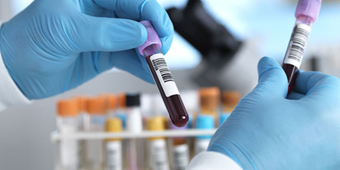- Cardiology And Vascular Health
- Health Topics
- Heart And Vascular Disease Prevention
- Heart Disease Risk Factors
Be Cholesterol Smart And Help Your Heart

Answer a few questions and we'll provide you with a list of primary care providers that best fit your needs.
Think managing your cholesterol is just for old folks? Think again.
The American Heart Association recommends that all adults age 20 or older have their cholesterol checked every four to six years. That means both men and women, overweight and normal weight people. Everybody.
Keeping your cholesterol levels healthy can help lower your risk for heart disease, heart attack and stroke. In fact, high cholesterol is one of the major controllable risk factors.
The Highs And Lows Of Cholesterol
Cholesterol comes from two sources – your liver and from animal-based foods (called dietary cholesterol), such as meat, poultry, and full-fat dairy products. Your liver makes all the cholesterol you need. However, the fats in some foods cause your liver to make more cholesterol than it otherwise would. For some people, this causes high cholesterol.
Together with other substances, cholesterol can form a thick, hard deposit (plaque) that can build up in the inner walls of arteries that feed your heart and brain, making these arteries narrower (atherosclerosis). If a clot forms and blocks a narrowed artery, a heart attack or stroke can result.
As cholesterol circulates in your blood, and as blood cholesterol levels rise, so does your risk for heart disease and stroke. A blood test will indicate your levels of:
- HDL (good) cholesterol. HDL cholesterol is “good” cholesterol, so higher levels are better. HDL levels are affected by how much you exercise and what you eat. A healthy HDL cholesterol level may protect against heart attack and stroke.
- LDL (bad) cholesterol. LDL cholesterol is called “bad” cholesterol because it contributes to atherosclerosis. A low LDL cholesterol level is considered good for your heart health. LDL levels are most affected by what you eat and by your genes.
- Triglycerides. Triglycerides are the most common type of fat in the body. A high triglyceride level combined with low HDL cholesterol or high LDL cholesterol is linked to atherosclerosis.
To determine how your cholesterol levels affect your risk of heart disease, your doctor will also take into account other risk factors.
Keeping your cholesterol levels healthy can help lower your risk for heart disease, heart attack, and stroke.
Who’s At Risk For Heart Disease?

In general, the higher your LDL level and the more risk factors you have, the greater your chances of developing heart disease or having a heart attack or stroke. Risk factors include:
- Age (men 45 years or older; women 55 years or older)
- Cigarette smoking
- Diabetes
- Family history of early heart disease (heart disease in father or brother before age 55; heart disease in mother or sister before age 65)
- High blood pressure
- Low HDL cholesterol
- Obesity and physical inactivity
Some people are genetically predisposed to high cholesterol. Postmenopausal women may experience increased risk for high cholesterol due to decreased estrogen levels. Estrogen offers some protection during child-bearing years.
Tips For Managing Your Cholesterol
Your doctor can calculate your cardiovascular risk score to determine the likelihood that you’ll develop heart disease in the next 10 years. If your risk is high, you can take action to lower your cholesterol.
Additionally, changing your diet can help lower your bad cholesterol level. A heart-healthy diet is one that is low in fat, much like the Mediterranean diet. Your doctor might also recommend regular physical activity as well as medications, including statins, to control your cholesterol.
Answer a few questions and we'll provide you with a list of primary care providers that best fit your needs.
Source: American Heart Association; U.S. Department of Health and Human Services




